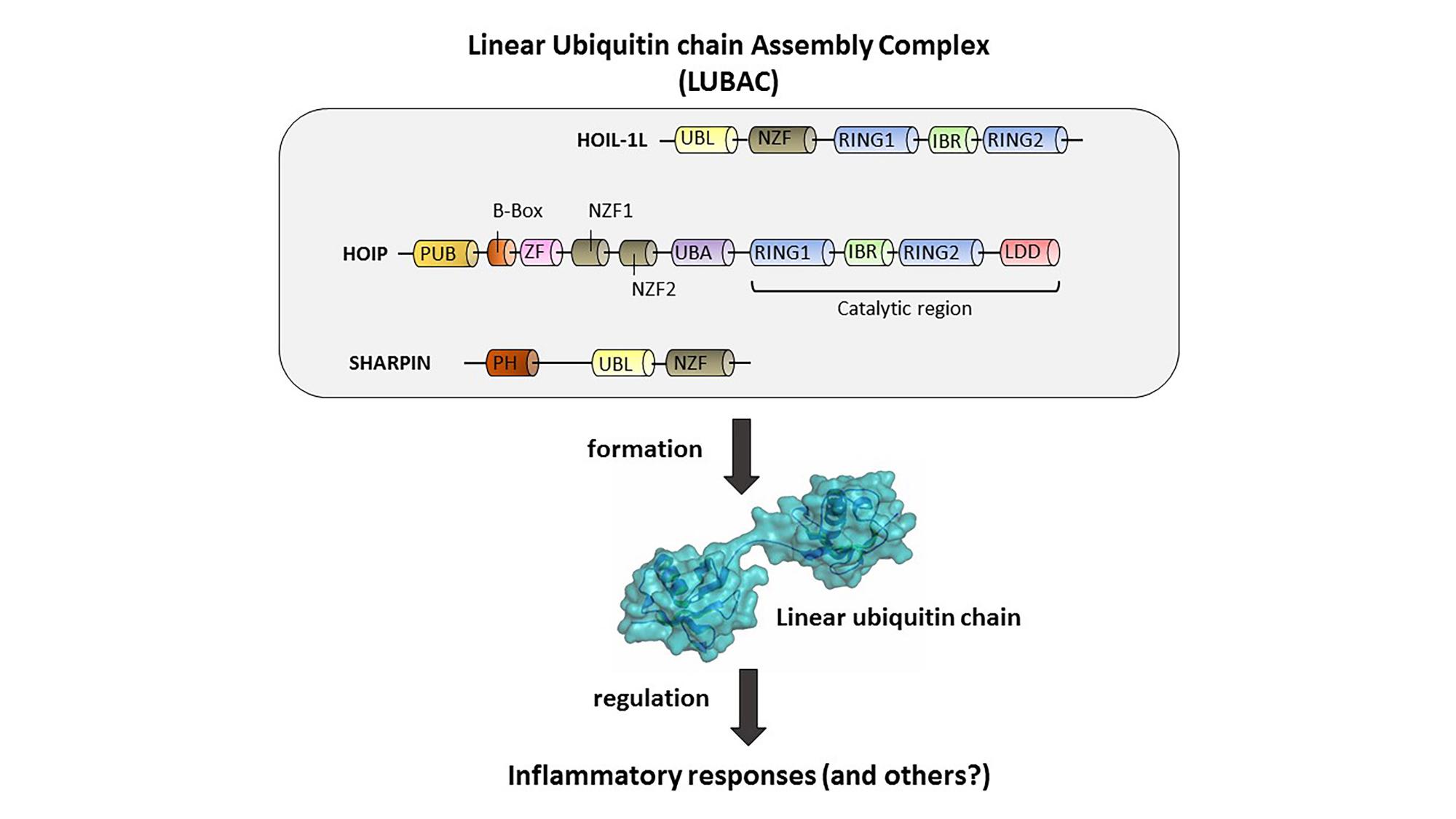Integrated Biology Laboratories
Ubiquitin Biology Laboratory
 Prof. IKEDA Fumiyo
Prof. IKEDA Fumiyo
Keywords:
Ubiquitin, Cell signaling, Inflammatory response, Cell death, Proteostasis
Elucidating the basic principles of the ubiquitin system, which regulates every aspect of biology

The ubiquitin codes we study, called linear ubiquitin chains, are generated by LUBAC. Linear ubiquitin chains, in which two ubiquitin molecules are conjugated via a specific linkage type, regulate inflammation and cell death.
Members
| IKEDA Fumiyo (Professor) | |
|---|---|
| YANAGITANI Kota (Assoc.Prof.) | |
| NISHIMURA Hiromi (TA) | |
| WATANABE Yasuyo (PA) | |
You could probably reach more information of individual researchers by Research Map and researcher's search of Osaka-U.
- ※Change [at] to @
Q&A
- What is your hot research topic?
- Recent studies show that ubiquitin modification can occur on non-protein targets. We are developing our research on the elucidation of the roles and regulatory mechanisms of ubiquitin modification on non-proteins.
- Have you had any breakthroughs or significant research progress in the last 5 years?
- We discovered a novel ubiquitin code that has a unique conjugation pattern using biochemical approaches (Rodriguez et al., 2021). We also revealed that an enzyme responsible for this process regulates inflammation via complex mechanisms by analyzing genetically modified mice (Gomez Diaz et al., 2021).
- What kind of background do your lab members have?
- Thus far, members from nine countries contributed to our research in the Ikeda Lab, including students sent from other labs, and others with various backgrounds and expertise. All have been highly motivated and full of curiosity.
- Do you collaborate with other institutions and universities?
- We are collaborating with researchers in Japan and Europe through the connections I made during my 15-year posting in Germany and Austria.
- What kind of careers do your Lab's alumni go on to?
- Many researchers from my lab have gone on to diverse career paths. Some are continuing science in academia as postdocs, PhD students, or senior research assistants; others are working in pharmaceutical companies.
- How do you develop your research?
- I hope we will elucidate mechanisms of more flexible types of ubiquitin editing, which may regulate human diseases.
Research Highlights
Publications (Research Articles, Reviews, Books)
2021
The ubiquitin ligase HOIL-1L regulates immune responses by interacting with linear ubiquitin chains
iScience 24(11):103241 2021 (PMID:34755089 DOI:10.1016/j.isci.2021.103241)
The linear ubiquitin chain assembly complex (LUBAC) generates heterotypic ubiquitin chains
eLife 10:e60660 2021 (PMID:34142657 DOI:10.7554/eLife.60660)
2020
Site-specific ubiquitination of the E3 ligase HOIP regulates apoptosis and immune signaling
EMBO J. 39(24):e103303 2020 (PMID:33215740 DOI:10.15252/embj.2019103303)
2018
The IAP family member BRUCE regulates autophagosome-lysosome fusion
Nat Commun. 9(1):599 2018 (PMID:29426817 DOI:10.1038/s41467-018-02823-x)
2016
Linear ubiquitination by LUBEL has a role in Drosophila heat stress response
EMBO Rep. 17(11):1624-1640 2016 (PMID:27702987 DOI:10.15252/embr.201642378)
Our ideal candidate (as a graduate student)
We are looking for candidates with high curiosity who have a strong interest in our research. Anyone who enjoys new challenges, discussion, and communicating with others are welcome.
Contact
Ubiquitin Biology Laboratory, Graduate School of Frontier Biosciences, Osaka University,
1-3 Yamadaoka, Suita, Osaka 565-0871 Japan.
TEL: +81-6-6879-4635
- ※Change [at] to @
